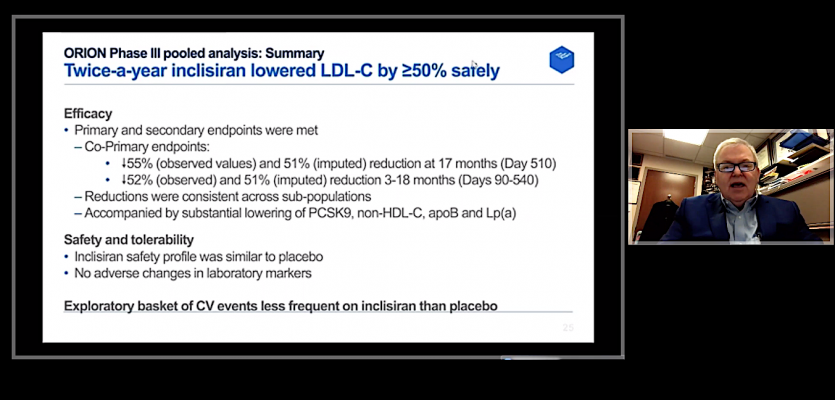
Scott Wright, M.D., Mayo Clinic, presenting the results at ACC on the two-dose a year LDL-lowering drug inclisiran, which had a significant reduction in LDL in the ORION Trial.
March 28. 2020 — Among adults with heterozygous familial hypercholesterolemia, those who received the drug inclisiran had significantly lower levels of low-density lipoprotein (LDL) cholesterol than those who received placebo, with an infrequent dosing regimen and an acceptable safety profile. This was the conclusion of a pooled analysis of three ORION Phase III trials (ORION-9, 10, and 11). The results were presented at the virtual presentations of the late-breaking studies at the American College of Cardiology (ACC) 2020 conference.[1]
The Medicines Company developed inclisiran, which is a small interfering RNA (siRNA) therapy being studied to evaluate its ability to lower LDL cholesterol. Inclisiran is designed to prevent the production of proprotein convertase subtilisin/kexin type 9 (PCSK9) at its primary source in the liver. Inclisiran is not yet approved for use by the FDA or any other regulatory authority.
There were robust reductions in LDL cholesterol levels in all genotypes of familial hypercholesterolemia and a adverse events and serious adverse events were similar in the two groups of the study, said Scott Wright, M.D., and investigator in the trial who presented the results at ACC and a consultant, division of preventive cardiology, Department of Cardiovascular Medicine, Mayo Clinic.
The drug is administered twice a year, and the trial researchers said this can help increase medication compliance because administration can coincide with twice annual visits with healthcare providers, Wright explained.
Familial hypercholesterolemia is characterized by an elevated level of LDL cholesterol and an increased risk of premature atherosclerotic cardiovascular disease. Monoclonal antibodies directed against proprotein convertase subtilisin–kexin type 9 (PCSK9) have been shown to reduce LDL cholesterol levels by more than 50 percent, but require administration every two to four weeks. In a phase 2 trial, a twice-yearly injection of inclisiran, a small interfering RNA, was shown to inhibit hepatic synthesis of PCSK9 in adults with heterozygous familial hypercholesterolemia.
The phase 3, double-blind trial, randomly assigned in a 1:1 ratio 482 adults who had heterozygous familial hypercholesterolemia to receive subcutaneous injections of inclisiran sodium (at a dose of 300 mg) or matching placebo on days one, 90, 270, and 450. The two primary end points were the percent change from baseline in the LDL cholesterol level on day 510 and the time-adjusted percent change from baseline in the LDL cholesterol level between day 90 and day 540.
The median age of the patients in the trial was 56 years, and 47 percent were men. The mean baseline level of LDL cholesterol was 153 mg per deciliter. According to the study, on day 510, the percent change in the LDL cholesterol level was a reduction of 39.7 percent (95 percent confidence interval [CI], −43.7 to −35.7) in the inclisiran group and an increase of 8.2 percent (95 percent CI, 4.3 to 12.2) in the placebo group. There was a between-group difference of −47.9 percentage points (95 percent CI, −53.5 to −42.3; P<0.001). The time-averaged percent change in the LDL cholesterol level between day 90 and day 540 was a reduction of 38.1 percent (95 percent CI, −41.1 to −35.1) in the inclisiran group and an increase of 6.2 percent (95 percent CI, 3.3 to 9.2) in the placebo group, for a between-group difference of −44.3 percentage points (95% CI, −48.5 to −40.1; P<0.001).
The study was funded by the Medicines Company.
Reference:


 July 31, 2024
July 31, 2024 









